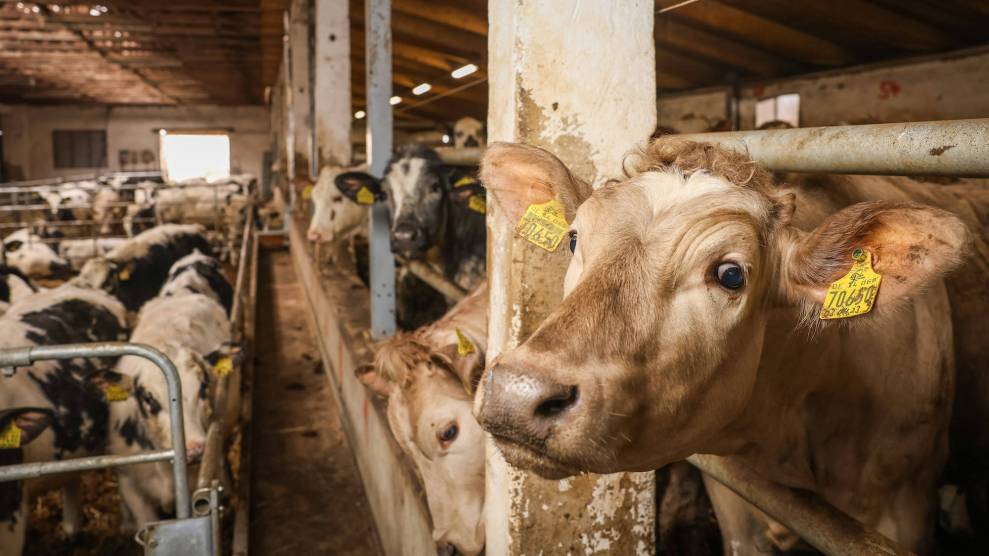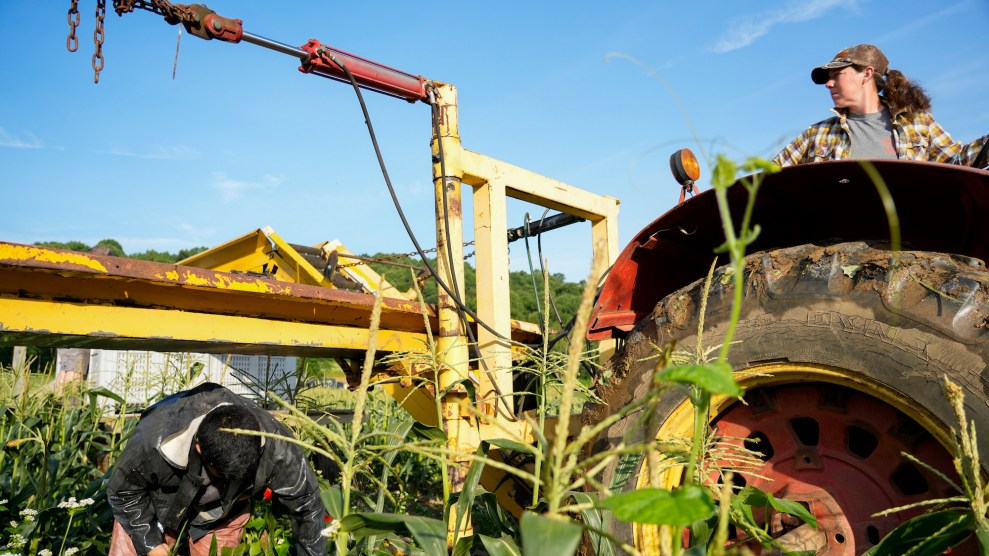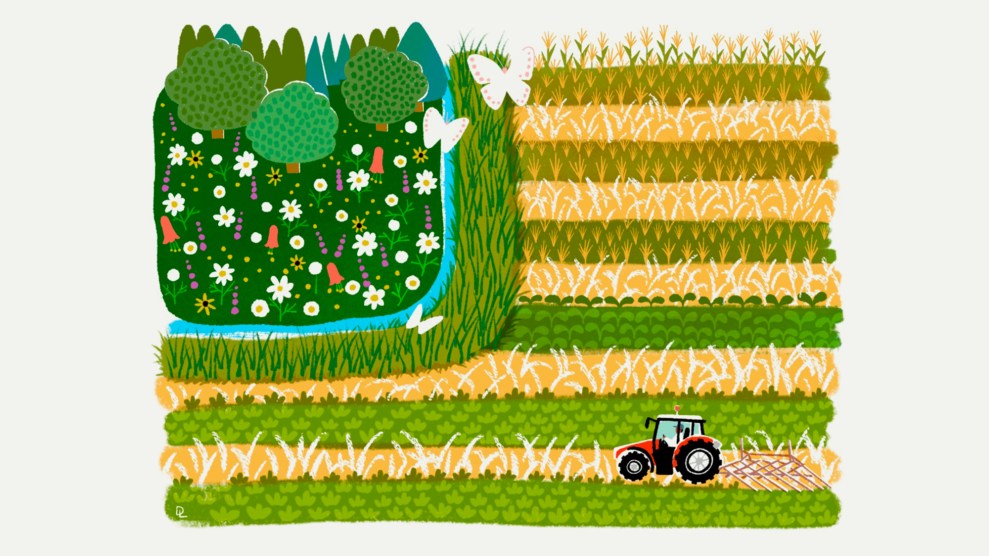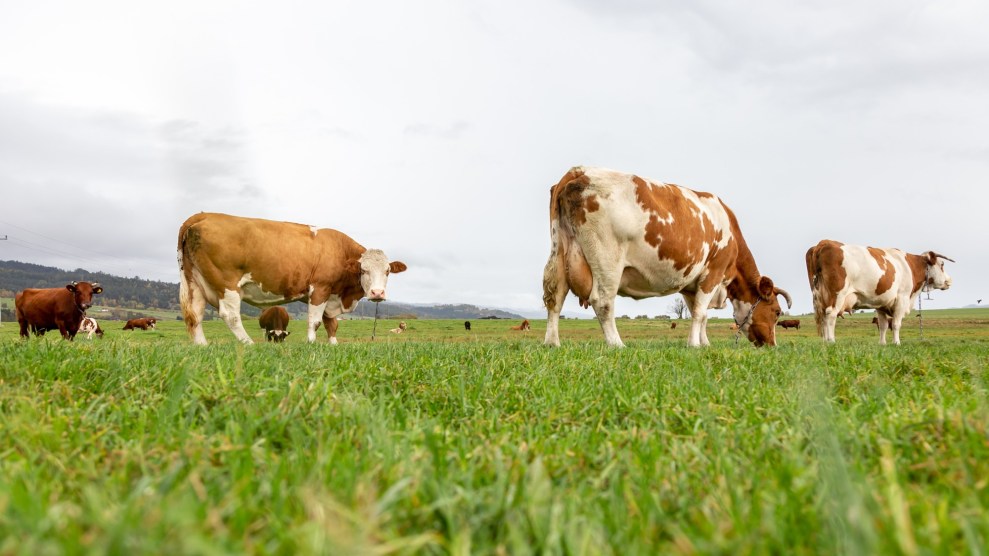
Zuma
This story was originally published by Inside Climate News and is reproduced here as part of the Climate Desk collaboration.
When researchers at the United Nations published a bombshell report in 2006 called “Livestock’s Long Shadow,” the livestock industry soon realized it had a major public relations challenge on its hands.
Media outlets around the world covered the report and its main findings: Livestock are a major source of greenhouse gas emissions that need to be reined in, and cutting emissions from the industry should become a focus of public policy, on par with cutting emissions from fossil fuels. It was the first time such a high-level report had come to this conclusion.
In the following 17 years, the report has been scrutinized by researchers, attacked from every angle, and referenced again and again, held up as a clarion call for worldwide veganism on one side, and on the other, a symbol of the climate-hysterical global nanny state bent on stealing everyone’s cheeseburgers.
But as the public has been whipsawed over its findings, new research says it has become increasingly clear why. Since the publication of the UN report, the livestock industry has worked strategically to unravel or downplay the report’s findings, and the findings of subsequent research that has reached similar or related conclusions.
A new study, published late last month in the journal Climatic Change, tracks the industry’s response to the report after it was published and in the ensuing years, charting how livestock, dairy, and grain companies, along with the agriculture lobby, have spent billions courting a crucial and influential voice—the academic specialist.
“Similar to fossil fuel companies, US animal agriculture companies responded to evidence that their products cause climate change by minimizing their role in the climate crisis and shaping policymaking in their favor,” the authors, Viveca Morris of Yale Law School and Jennifer Jacquet of the University of Miami write. “Here we show that the industry has done so with the help of university experts.”
The industry’s efforts, the authors argue, have helped these experts and their universities influence public opinion and craft policy in such a way that agriculture and emissions from agriculture in the US remain largely unregulated, despite their significant impact—and despite subsequent years of research demonstrating the impact of animal agriculture on the climate. They also argue that, while livestock industry funding has supported research before, funding universities’ research is uniquely influential and problematic.
At the time of the livestock report’s publication, nearly two decades ago, its message was brand new. None of the major UN climate reports had addressed livestock’s greenhouse gas emissions, and research on the climate impacts was scarce. The world had barely grasped that burning fossil fuels was altering the climate.
But in the US, home to some of the world’s biggest meat and dairy companies, the industry developed a strategy as scrutiny on their stock-in-trade intensified.
In 2009, three years after the publication of “Livestock’s Long Shadow,” the Beef Checkoff program, a promotional program run by the beef industry, gave $26,000 to Frank Mitloehner, then a specialist in the animal science department at the University of California, Davis, to look into the UN report, the study said.
That was the beginning of a relationship that continues to this day and has funneled millions of dollars to Mitloehner, his proteges and their universities, Morris and Jacquet write. This, they say, has helped protect the industry from regulation and reputational damage.
Mitloehner and his co-authors, Maurice Pitesky and Kimberly Stackhouse, later in 2009, issued a rebuttal of sorts in a paper published in the journal Advances in Agronomy called “Clearing the Air: Livestock’s Contribution to Climate Change.” The paper said the greenhouse gas figure the U.N. report attributed to livestock—18 percent of total global emissions—was actually significantly smaller in the US. Livestock in the US, they argued, only generated about 3 percent of the country’s total greenhouse gas emissions. They also noted that the 18 percent figure, which the UN report claimed was higher than emissions from the entire transportation sector, was overstated because the UN analysis included the entire life cycle of livestock emissions, but not of transportation.
Using new models, and after pressure from the global livestock industry, including US companies, a later UN report lowered the livestock emissions figure to 14.5 percent of total global emissions.
In “Clearing the Air” the authors stressed that livestock production was projected to grow in the developing world “where food security becomes imperative,” using a frequently repeated refrain that argues people will go hungry without adequate livestock production. The paper did not acknowledge the US beef industry’s support for the research, as is customary. A press release about the report from UC Davis, titled “Don’t Blame Cows for Climate Change,” did acknowledge the industry funding.
On that point, Mitloehner said in an interview with Inside Climate News, “There’s nothing hush-hush about this. You can’t make something more publicly known than in a press release.”
“Clearing the Air,” in turn, got a barrage of media coverage that effectively said Mitloehner and his colleagues’ work had disproven that livestock was a major contributor to greenhouse gases. The meat industry’s largest lobbying group, the North American Meat Institute, launched a “Media Myth Crusher” brief, claiming that the 18 percent figure was “widely challenged by scientists.”
Morris and Jacquet say the report was the beginning of an ongoing relationship between the livestock industry, Mitloehner and Stackhouse (now Stackhouse-Lawson), then his student and now a professor at Colorado State University.
In the following years, they write, the livestock industry gave millions to Mitloehner and later to Stackhouse as they launched research centers at their respective universities. In 2018 Mitloehner founded the Clarity and Leadership for Environmental Awareness (CLEAR) Center at UC Davis to bring “clarity to the relationship of animal agriculture, the environment and our daily lives.” Over the next two years, CSU launched AgNext, to promote the livestock industry’s sustainability efforts, hiring Stackhouse-Lawson as its director.
At the time, Stackhouse-Lawson was the chief sustainability officer of JBS USA, the US arm of JBS, the world’s biggest meat company. JBS USA maintains one of the country’s largest cattle feedlots in Greeley, Colorado, and has had a long relationship with CSU, which is in nearby Fort Collins. In 2017, JBS and CSU launched a partnership with a $12.5 million grant from the company.
CSU and UC Davis provided written statements, rather than interviews with deans of the relevant departments.
“It is common for industry and government to fund programs, equipment, and even research; however, university research is independent and objective—funding sources have no influence on AgNext research outcomes,” Stackhouse-Lawson said in a prepared statement.
James Nash, a spokesman for UC Davis, sent the following statement: “UC Davis faculty adhere to the highest levels of integrity and ethical conduct. We stand by Professor Mitloehner’s research and support his efforts to work with the agricultural sector to reduce its climate and environmental footprint. The university has rigorous policies in place to enforce high ethical standards in our relationships with research partners.”
By analyzing company records with disclosures, Mitloehner’s CV, press releases, research papers, and tax documents, the authors cross-checked Mitloehner’s financial reporting. His CV says he has received nearly $5.5 million in industry funding, representing about 46 percent of his total $12 million of funding reported from 2002 to 2021.
The study notes that some of Mitloehner’s testimony, papers, and CV don’t disclose some of the funding he received. His CV shows he received $4 million from Elanco Animal Health, but subsequent papers, from 2012 to 2023, did not acknowledge that funding.
His CV also omits funding he has received from the National Cattlemen’s Beef Association, the cattle industry’s biggest lobbying group. Mitloehner is also listed as a director of Distributors Processing, Inc., a privately held feed additive company.
Mitloehner, in particular, became a regular speaker at industry conferences, regularly cited in the media, and increasingly popular on X (formerly Twitter) with the handle @GHGGuru—short for greenhouse gas guru. His work was cited as the livestock industry opposed a bill in Congress to require mandatory reporting under the Environmental Protection Agency’s Greenhouse Gas Reporting Program. He became a policy advisor to the Obama White House, and wrote a white paper that persuaded the administration to drop environmental and sustainability considerations from the influential U.S. Dietary Guidelines. He testified in 2019 before the Senate Agriculture Committee, saying the industry’s greenhouse gas impact “pales in comparison to other sectors.” His testimony was later repeated in industry publications.
After “Livestock’s Long Shadow” was published, Mitloehner became chairman of the Livestock Environmental Assessment and Performance Partnership (LEAP) at the UN, which was formed after discussions among industry players and with $72,000 in support from the American Feed Industry Association’s nonprofit wing, known as IFEEDER.
More recently he has advocated for a new accounting method to measure the warming impact of methane, an especially potent greenhouse gas, from cows, the largest source of methane in the US. This method has gained significant traction in industry publications but is debated by climate scientists.
Jacquet, a professor of environmental science and policy at the University of Miami whose research has focused on lobbying and financial influence, says she first became interested in Mitloehner when he attacked Alexandria Ocasio-Cortez’s Green New Deal, which included a proposal to tax emissions from cattle. After Mitloehner met with Ocasio-Cortez’s team, the proposal was dropped.
“That was the moment, for me, when I was like, ‘Wow, this guy’s having an impact’ and that he must be valuable to the industry,” Jacquet said.
Morris, the lead author on the Climatic Change study and the executive director of the Law, Ethics & Animals Program at Yale Law School, and Jacquet point to similarities between tobacco and fossil fuel industry strategies, particularly the fossil fuel industry’s positioning of people as experts, when they may not have expertise in a given subject. Mitloehner, they point out, is not a climate scientist.
Mitloehner has a master’s in animal science and agricultural engineering and a Ph.D. in animal science and was recruited by UC Davis in 2002 to focus on livestock and air quality.
In an interview with Inside Climate News, Jacquet likened Mitloehner to Willie Soon, the Harvard-Smithsonian scientist who described his research as “deliverables” for the fossil fuel industry.
“The industry can create experts,” Jacquet said, adding that Mitloehner is “not a climate expert—the industry makes him into one.”
Mitloehner is getting accustomed to the critiques of his financial ties but is particularly incensed with the Climatic Change study, questioning how it passed a rigorous peer review process, and said it doesn’t address the substance of his work.
He noted, in an interview, that it’s in his job description to work with the industry to help it lower emissions.
“There’s nothing fishy about me working with animal agriculture. In fact, it’s my charge—it’s in my job description,” he said. “I’m known for being an expert in how to quantify and mitigate emissions.”
Mitloehner noted that he has authored 130 publications and that the “validity of those publications isn’t challenged in the recent study.”
He said that, while he may not be a climatologist, he is a specialist in animal agriculture’s impact on air quality.
“I work on greenhouse gas emissions, and more importantly, on quantifying those from animal agriculture,” he said. “If you work on reducing emissions from animal agriculture, your stakeholders are people in animal agriculture. The technologies and approaches that we use are provided by companies that come from animal agriculture. Those are the companies that provide the technologies to reduce emissions.”
Mitloehner explained that about 70 percent of the university-based agricultural research comes from private industry. “In my case, it’s about half,” he said, referring to the $5.5 million. “There’s nothing unusual about that.”
He noted that farmers across Europe are taking to the streets because they feel their governments are foisting climate-related measures on them that they believe will cost them money. Mitloehner says he has their ear and they trust him.
“I’m one of the few people who can explain to them how to do these things,” he said. “They’re saying I’m too close to agriculture. That, to me, is very counterproductive.”











